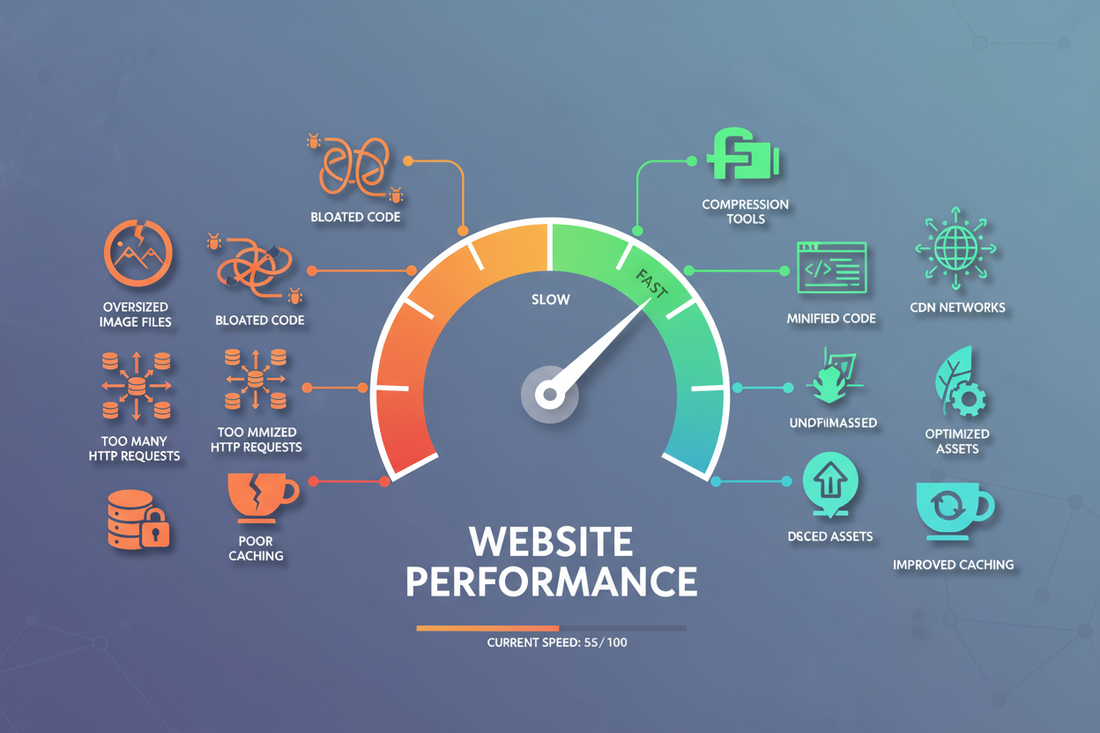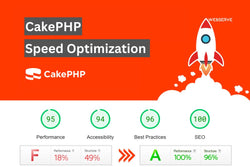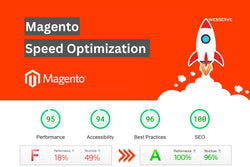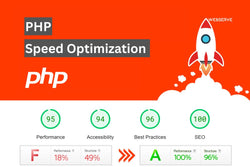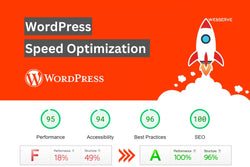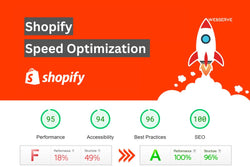Why Website Speed Matters More Than Ever
Website visitors expect instant results. As per the latest page load performance benchmarks by Google, 53% users duck a site that takes more than 3 seconds to load. A sluggish website isn’t just annoying to the people who visit it – it can also be very detrimental to online conversions, SEO and overall brand credibility.
Google's newest user experience metrics — LCP, CLS, and INP — measure the loading experience as it’s perceived by visitors to your site, helping you identity where on your pages issues that affect how long it takes for them to feel fast, stable or responsive. When your site doesn’t measure up here, Google takes this as a sign that your user experience is poor—and your rankings plummet.
Webserve Digital full optimized over 3,000 websites on a wide range of CMS' and frameworks. By doing a detailed speed analysis we discovered that the majority of slow websites have a few common issues which, when fixed, will more often than not completely transform the loading time of their site.
1. Oversized Images and Unoptimized Media
Heavy images are the number one reason your website is slow. Most site owners put up raw pictures straight from a camera, or uncompressed design files at full resolution.
How to Fix It:
Turn images into next-gen formats such as WebP or AVIF, use tools like TinyPNG and ShortPixel to compress them without quality degradation, and ensure they have proper sizing for responsive loading. Use lazy loading for the images to load only when they become visible on the screen of the user.
Our WordPress Speed optimization and Shopify speed optimization services pay special attention to automated image compression and smart lazy-loading setups that will immediately leapfrog your LCP scores and overall site load times.
2. Excessive or Poorly Coded Plugins and Apps
Plugins and third party scripts are awesome–but they can sometimes kill performance. Every plugin brings additional CSS, JavaScript and database requests to visitors’ browsers, thus slowing down your site.
How to Fix It:
Regularly audit your plugins and delete ones you don’t need. Ditch the old, heavy plugins for lightweight replacements. If you are in the eCommerce niche: refrain from overloading your shopify with apps or magentos having tens of external scripts.
Our technical audit includes everything from in-depth Magento performance optimization, Shopify speed optimization to cake Laravel website optimization with deep plugins audits to script cleanup and code-level fine-tuning to get you over that 90 PageSpeed Insights score promise.
3. Bloated or Unoptimized Code
Unnecessary white space, duplicate CSS selectors, unused JavaScript elements and poorly structured HTML are all coding jams that can slow your site. This is a ubiquitous problem on both home-grown and CMS driven sites.
How to Fix It:
Minify CSS, JavaScript, and HTML. Lazy load non-essential JS and async where you can. And for PHP-frameworks, the emphasis should be on database query optimization.
Our PHP website speed optimization, CodeIgniter speed optimization, CakePHP speed optimization and Symfony speed optimization services are mainly focused on code optimisation and in the restructuring of the backend to help make your server respond faster have a lower TTFB (Time to First Byte ratio).
4. Poor Hosting or Server Configuration
No amount of front-end optimization will save you if your server is weak. Shared hosting, obsolete php versions and high latency servers that time in seconds can be added to your page load time.
How to Fix It:
Select a speed-optimized hosting provider with SSD storage, CDN integration and global edge delivery. Setup CMS platforms with caching layers such as Redis or Varnish.
Our Drupal optimization, Yii speed optimization and Smarty PHP Speed Optimization focuses front-end as well-page load time resulting in majority times of around 3 seconds and below page load time for every part of the globe.
5. Not Leveraging Browser and Server Caching
Each time a user visits your website, their browser downloads the files afresh if caching isn’t enabled. This makes repeat visits really slow, and is also a waste of your server's resources.
How to Fix It:
Leverage browser caching, as well as plugins or server side tools for storing static content. Set expiration time for common files to store in your user’s browser.
Our HTML speed optimization, Wix speed optimization, Squarespace speed optimization, and Webflow performance optimization services provide a custom caching to achieve dramatically reduced return visit load times.
6. Ignoring Mobile Optimization
Google’s mobile-first indexing is such that, if your mobile site speed is slow, it affects how you rank across the board. Yet still, many websites aren’t mobile-optimized.
How to Fix It:
Employ responsive design, cut down on third-party tracking scripts and cater for smaller screen sizes. Do not use full-screen popups and large background videos that hinder rendering.
Our HubSpot speed optimization, BigCommerce speed optimization, and Weebly speed optimization developers enhance mobile experience with responsive CSS frameworks, delivering adaptable image delivery systems.
7. No CDN or Poor Content Delivery Strategy
CDN (Content Delivery Network) makes multiple copies of your information on servers around the world that are then served by the closest server location to speed up access for every visitor, from anywhere. Without it, your site hangs on a single origin server and underperforms for international visitors.
How to Fix It:
Use a solid CDN like Cloudflare or Bunny. net. Set cache and turn on Brotli or GZIP to get the smallest files.
Our Angular speed optimization, Java website acceleration, React speed optimization services use advanced CDN settings and code-splitting to deliver illuminating rendering speeds that your customers will definitely notice.
Data Analysis: How Fixing These Mistakes Boosts Real Results
Based on Webserve Digital’s internal performance reports across 300+ client websites:
-
Average page load time decreased by 65% after fixing plugin bloat and caching issues.
-
Core Web Vitals improved by 40%, pushing average PageSpeed scores above 90.
-
Sites experienced a 32% reduction in bounce rate and a 22% increase in organic traffic within 60 days.
These results prove that addressing even a few of these common speed issues can directly enhance SEO performance, user satisfaction, and conversions.
Final Thoughts
Site speed is not only a technical measure — it’s a ranking signal, a conversion factor and even an element of trust. So whether you have a WordPress, Shopify, Laravel or Magento site and want to ensure running smooth as possible isn’t just the recommended course of action – it’s one of the smartest investments that will secure your future.
We promise 90+ PageSpeed scores and load times <3 seconds by real results or your money back.
FAQs on Common Website Speed Mistakes
Q1. Why is my website still slow after optimization?
Even server bottlenecks, unoptimized third-party scripts or a high number of DOM elements could make the difference. We conduct a comprehensive audit of your website to uncover hidden performance hogs and offer fixes you can ACTUALLY work on.
Q2. What is the most common cause of slow websites?
The most common offender across platforms – including WordPress, Shopify and Magento – is uncompressed images along with plugins that are too heavy.
Q3. How long does it take to fix website speed issues?
Most speed problems should be addressed within 24-72 hours by our website speed optimization specialists depending on your site structure and if you don’t see a significant difference in your site’s performance, let us know so that we can finetune it.
Q4. Do speed optimization services improve SEO rankings?
“Yes, it does help google rankings and conversion rate to speed up site and ram the Core Web Vitals home!”
Q5. Can you optimize all website platforms?
Absolutely. We are expert in WordPress speed optimization, Shopify speed optimization, Laravel website optimization, Magento performance optimization and all kinds of CMS and Frameworks.
